Arkansas lawmakers on Monday passed the most sweeping ban on transgender healthcare in the US, with legislation that restricts trans kids’ access to gender-affirming care and punishes doctors who treat them.
It’s one of dozens of states where Republicans are pushing legislation that seeks to restrict trans youths’ access to sports teams that match their gender and outlaw gender-affirming healthcare. As the bills advance, trans kids are increasingly speaking out on the effects these efforts have on their lives, with some traveling to their state capitals to demand a voice in the debate.
Here, trans kids and their families reflect on their experiences, the role sports and trans healthcare play in their lives, and their fight for equality. The interviews are edited and condensed for clarity.
On the bathroom issue: ‘This is a basic human need’
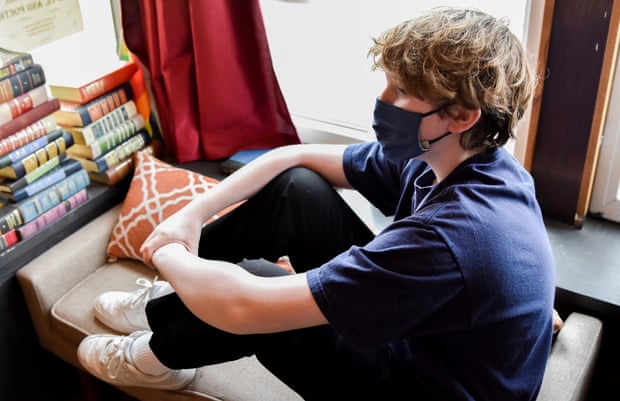
Wyatt Williams, 14, South Dakota: At school, they make me use the single-stall staff bathroom. I have to walk all the way across a long hallway, in front of eight classes, enter a door and then another door and then there’s the bathroom. The other boys are just allowed to walk about 10 feet. [Going to the bathroom] is a basic human need.
I’ve asked my guy friends that know I’m trans if they’d be uncomfortable if I was in the boys’ restroom. They wouldn’t. It’s the bathroom for crying out loud.
And while I’m used to it now, I still get this nervousness going to the bathroom. I wonder: ‘What will people think of me?’ As a 14-year-old, I shouldn’t have to be worried about my rights being taken away. I should not have to go out of my way to make other people happy. I’m not a problem to society. They are saying there are things wrong with us because of who we are. It doesn’t make me feel valued in the slightest. I just hope by the time I’m 18, things are better, because I don’t want other kids to have to grow up at age 10 and have their basic human rights debated.
On playing sports: ‘I’ve worked so hard’
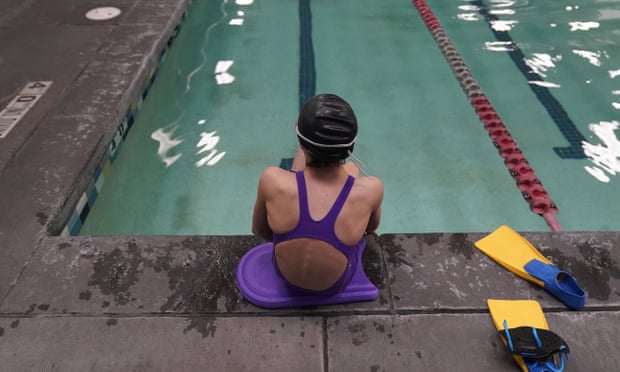
Ava*, 12, Utah: Swimming for me is a way to be with friends and escape the stress of life and have fun. I have been swimming my whole life. I love it and always have, it’s just the best feeling. If I wasn’t able to keep swimming, it would make me really sad. I wouldn’t be able to see my friends. It would be pretty lonely. It’s a piece of your life that you work so hard for, and for it just to be taken away is hard. It just seems that [the lawmakers] only care about what’s in my pants and not about all the stuff I can bring to the team and all my hard work.
When the bill was canceled, I was so happy and relieved, because it meant I could, for now at least, keep swimming and hopefully be able to swim on the high school team in the future.
On being banned from the team: ‘She knew it wasn’t right’
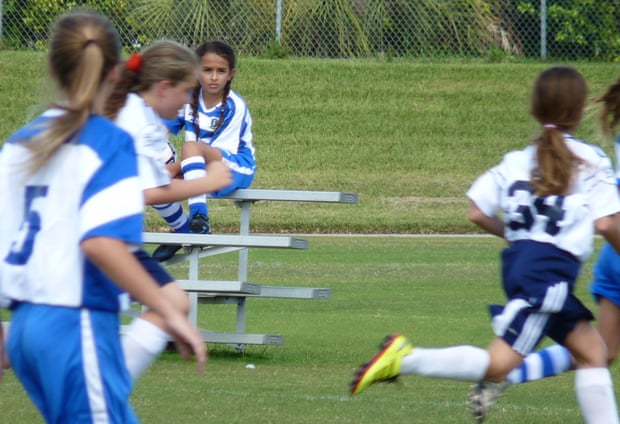
Jeanette Jennings, mother of Jazz Jennings, a trans youth reality star, Florida: When Jazz was eight, she was banned from the girls’ soccer team. It was ugly. They told us Jazz was welcome to play on the boys’ team, or she could practice with the girls but be benched for all the games. But she wanted to play the games, so she decided to play with the boys. She really didn’t like it. She couldn’t bond with them. She had only had girl friends. She couldn’t play the way she wanted to play. She was holding back, she didn’t want to touch the boys. It got to the point where she was having such anxiety. She’d go out to the field and just stand there, paralyzed and frozen, or crying hysterically. Little kids know right from wrong, and she knew this wasn’t right.
You have these politicians out there that have this fear of transgender kids, with bathrooms and now with sports. I don’t understand it. We fought so hard to win our battles. To see it all unraveling now is breaking my heart. I’m torn up about this. It’s discrimination at its ugliest.
On the support of the team: ‘They are 100% behind me’
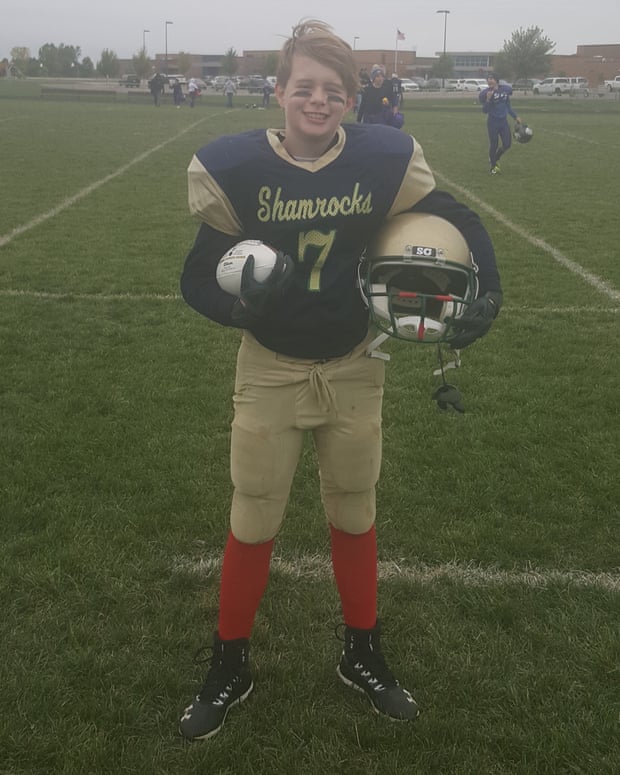
Kris Wilka, 13, South Dakota: I started playing football when I was eight. Then at my first junior high school, they contacted my dad and said: ‘We’re just afraid that he’s going to confuse the other kids and it’s not going to be a good experience for him and the other kids.’ They weren’t worried about my school education. They were just worried I might confuse people. I was shocked. And I was worried about not being able to continue football at all.
I switched schools and it was amazing. I told all my teachers I was trans, and they didn’t even really care. They treated me as any other student, as any other kid on the team. That’s what I wanted. I didn’t want to be the outcast. I’ve made some of my closest friends on the football team. They are 100% behind me. They are just so supportive. I was a starting lineman because I showed I was just as good as anyone else. They respected that. They gave me the position they thought I deserved.
On the healthcare at stake: ‘Treatment has made all the difference’
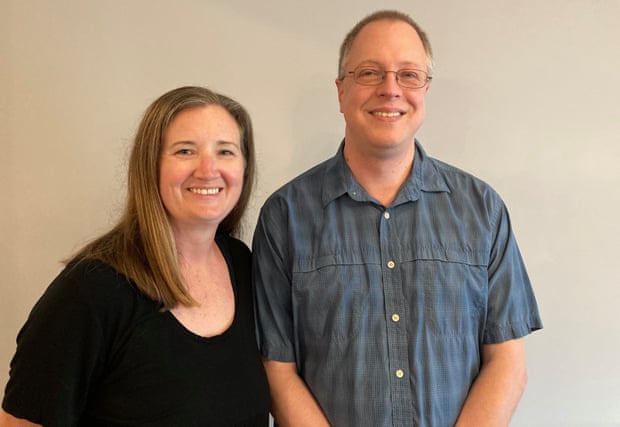
Christa and Jeffrey White, parents of a 12-year-old trans girl, Alabama
Christa: The [gender-affirming care] has made all the difference. Her confidence just soared. I can’t even explain how much more vibrant and full of life she is, just knowing that she is being who she is.
These kids aren’t going anywhere. They’re here. They are who they are. And our job as parents and humans and citizens of the world is to just help them find themselves and be themselves without question and without anger. Let these kids be.
Jeffrey: I’m an engineer, so I’ve read a lot of scientific papers over the years. And I spent a fair amount of time looking at the medical literature on this, which is very clear about the drops in suicide rates that occur when you provide this treatment to these kids. It’s a double-digits reduction. So to have that treatment taken away, it really puts our daughter at risk, and it’s for no other reason than they just want to mark off a checkbox in their rigid worldview. Science doesn’t care about your worldview.
On facing legislators: ‘They don’t really listen’
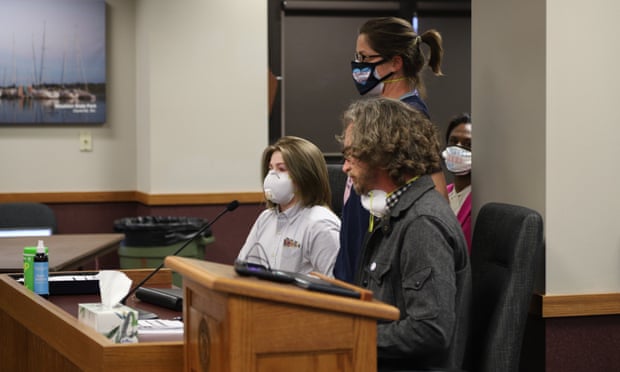
Miles, 14, Missouri: It’s not super easy going to the Capitol. I’ve been eight or nine times, so I’m used to it, but the hardest part is seeing the kids who are younger than me, and the knowledge of what they are going to go through. I’m used to hearing the legislators talk about my community, so I don’t get really mad any more. But it’s not easy, and it’s definitely not OK. I know they don’t really know me, either. So I don’t really take it to heart what they say. They don’t know my experiences, and even if I try to tell them, they don’t really listen.
I want them to know that I’m a kid just like any other kid. My personal life journey has definitely not been easy. Being trans itself is not difficult. The hard part is the societal view. People don’t attempt suicide because they’re trans, they harm themselves because of how society views them. How they view us affects how they treat us, and that affects our mental health.
If this [proposed healthcare ban] would pass, I would have to move to another state to get healthcare, which means I’d have to leave my grandparents, my family, my best friends, all these people who I love, just because other people have an opinion about me or are uncomfortable knowing that I might be in the same room as them.
On fighting the bills: ‘It’s going to take a lot to stop them’
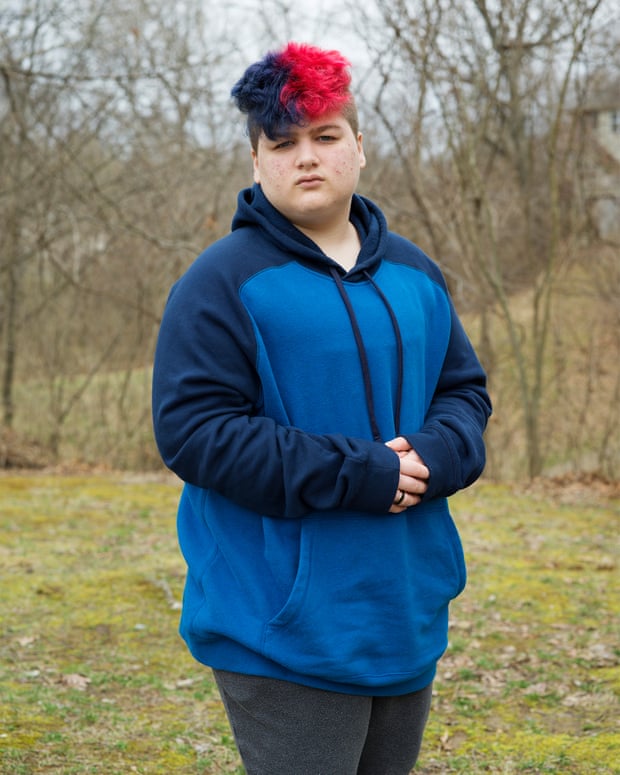
Corey Hyman, 15, Missouri: It’s going to take a lot of us to stop these bills. It’s going to take a lot out of us, out of our parents, out of our supporters. [This fight will] probably go on for many years.
I could be spending this time with my friends. I could be playing games with my family. I could be walking my dog. I could be doing anything, but I can’t because I’m worried and I’m scared that even more bills are going to be put through. Sometimes we don’t get notice about the bills until 24 hours before. It’s like, ‘By the way, tomorrow’s a Senate hearing that could quite literally end your life.’ They just don’t care.
The Guardian agreed to identify Ava by a pseudonym to protect her privacy
In the US, the National Suicide Prevention Lifeline is at 800-273-8255 and online chat is also available. You can also text HOME to 741741 to connect with a crisis text line counselor. In the UK and Ireland, Samaritans can be contacted on 116 123 or email jo@samaritans.org or jo@samaritans.ie. In Australia, the crisis support service Lifeline is 13 11 14. Other international helplines can be found at www.befrienders.org